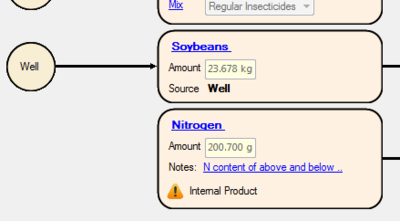Soybean Farming: Difference between revisions
Jump to navigation
Jump to search
No edit summary |
|||
| Line 1: | Line 1: | ||
==Soybean Farming Inputs== | ==Soybean Farming Inputs== | ||
[[File:soybean-farming-tricks.png|thumb|left|400px|Special inputs of soybean farming]] | |||
The inputs for soybean farming includes fossil fuels as energy sources for tractors, stationary engines and boilers and fertilizers. Two inputs are however a little bit more subtle to understand : | The inputs for soybean farming includes fossil fuels as energy sources for tractors, stationary engines and boilers and fertilizers. Two inputs are however a little bit more subtle to understand : | ||
* The first one is Soybean. The soybean amount is not really necessary for modeling the overhead associated to the production of Soybeans, but as we decided to respect the principle of matter conservation we have to include it. The input source is selected as "well" which means that there is no upstream associated with that input but we are going to see it though all the downstream pathways. As we trace all the basic resources necessary to produce a fuel, we'll see in the result how much soybeans were necessary to produce a liter of fuel. | * The first one is Soybean. The soybean amount is not really necessary for modeling the overhead associated to the production of Soybeans, but as we decided to respect the principle of matter conservation we have to include it. The input source is selected as "well" which means that there is no upstream associated with that input but we are going to see it though all the downstream pathways. As we trace all the basic resources necessary to produce a fuel, we'll see in the result how much soybeans were necessary to produce a liter of fuel. | ||
* The second input which requires some attention is Nitrogen (N content of above and below ground biomass: grams). This input source is selected as "Well" which means that no upstream is associated to it, and we also added the flag "Internal Product". Internal product means that this input will not be accounted in the I/O Energy/Mass/Volume balance, but that the emissions associated to that input will be accounted. We are setting it as Internal Product so the Nitrogen content below ground biomass will not show up in the downstream, but the emissions associated to will. | * The second input which requires some attention is Nitrogen (N content of above and below ground biomass: grams). This input source is selected as "Well" which means that no upstream is associated to it, and we also added the flag "Internal Product". Internal product means that this input will not be accounted in the I/O Energy/Mass/Volume balance, but that the emissions associated to that input will be accounted. We are setting it as Internal Product so the Nitrogen content below ground biomass will not show up in the downstream, but the emissions associated to will. | ||
Revision as of 16:39, April 16, 2012
Soybean Farming Inputs
The inputs for soybean farming includes fossil fuels as energy sources for tractors, stationary engines and boilers and fertilizers. Two inputs are however a little bit more subtle to understand :
- The first one is Soybean. The soybean amount is not really necessary for modeling the overhead associated to the production of Soybeans, but as we decided to respect the principle of matter conservation we have to include it. The input source is selected as "well" which means that there is no upstream associated with that input but we are going to see it though all the downstream pathways. As we trace all the basic resources necessary to produce a fuel, we'll see in the result how much soybeans were necessary to produce a liter of fuel.
- The second input which requires some attention is Nitrogen (N content of above and below ground biomass: grams). This input source is selected as "Well" which means that no upstream is associated to it, and we also added the flag "Internal Product". Internal product means that this input will not be accounted in the I/O Energy/Mass/Volume balance, but that the emissions associated to that input will be accounted. We are setting it as Internal Product so the Nitrogen content below ground biomass will not show up in the downstream, but the emissions associated to will.
